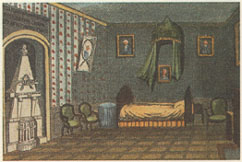

Karamzin (1766-1826) became leader of the sentimentalist movement in Russian literature. His Letters of a Russian Traveler appeared in installments in the Moscow Journal starting in 1791; a complete version appeared in 1801. The English translation here is taken from Florence Jonas (Columbia University Press, 1957).
Who, being in the republic of Geneva, would not consider it a pleasant duty to visit Ferney, where the most illustrious writer of our age lived?
I walked there with a young German. The late Voltaire's home is situated on an elevation a short distance from the village of Ferney. There is a beautiful allée leading to it. In front of the house, on the left, we saw a small church bearing the inscription, "From Voltaire to God."
"Voltaire was one of the ardent worshipers of the deity," said La Harpe in his eulogy on the famous sage of Ferney. "'Si Dieu n'existait pas, il faudrait l'inventer' (If God did not exist, he would have to be invented)-this wonderful line was written in his old age, and it indicates his philosophy."
A man, who came out to moet us, refused us admission, saying that his master, to whom Voltaire's famous heiress had sold this mansion, had given orders that no one be permitted to enter. However, as soon as we assured him of our generosity, he opened the door to the sanctuary, the rooms where Voltaire had lived and where everything has been left just as it was. The furnishings in the room are fine and rather sumptuous. Voltaire's heart was kept in the chamber where his bed stands, until Madame Denis took it to Paris with her. Now there remains only a black monument with the inscription, "Son esprit est partout et son coeur est ici" (His spirit is everywhere, his heart is here). And over this, "Mes manes sont consolés, puisque mon coeur est au milieu de vous" (My shades are comforted, for my heart is amongst you).
On the walls hang several portraits: first, our empress (embroidered on silk, with the inscription, "Présenté à M. Voltaire par l'auteur." This one I contemplated with greater attention and greater pleasure than the others); second, the late king of Prussia; third, LeKain, the noted Parisian actor; fourth, Voltaire himself; and fifth, the Marquise du Châtelet, who was his friend and more than a friend. Among the engravings I noticed portraits of Newton, Boileau, Marmontel, d'Alembert, Franklin, Helvétius, Clement XIV, Diderot, and Delisle. The other prints and paintings are not particularly interesting.
Voltaire's bedroom served him also as a study from which he taught, stirred, and amused Europe. Yes, my friends! It must be acknowledged that no other writer of the eighteenth century had such an impact upon his contemporaries as Voltaire. To his honor let it be said that he spread that tolerance in religious matters which characterizes our time, and covered with shame the infamous superstition which, even in the beginning of the eighteenth century, created bloody victims in our Europe.
Voltaire wrote for every kind of reader, for the unlearned as well as the learned. All understood him and all were captivated by him. No one else could expose so skillfully the ridiculous in all things, and no philosophy has been able to withstand his irony. The public was always on his side, for he gave them the pleasure of laughing! We do not find in Voltaire's works, generally, those lofty ideas with which the Genius of Nature, so to speak, inspires its chosen mortals. But these ideas are given to but a few people, and therefore their influence is very limited. Everyone likes to watch the skylark soar, but whose eye will dare to follow the eagle to the sun? Who does not feel the beauties of Zaire? But do many admire Othello?
The location of Ferney is so beautiful that I envied Voltaire. From his windows he could see Mont Blanc, the loftiest peak in Europe, and other snowy piles, together with verdant fields, gardens, and further pleasing sights. The Ferney garden Voltaire himself planned, and it reflects his taste. I liked most of all a long path, which seems to join the mountains. A large, clear pond serves as a mirror for the tall trees which shade its bank.
Voltairets name is on the lips of all the inhabitants of Ferney. Sitting there beneath the boughs of a chestnut tree, I read with feeling this passage of La Harpe's eulogy:
"His subjects, robbed of their father and master, and their children, heirs of his bounty, will say to the wanderer who leaves his path to see Ferney, 'Here are the houses he built, the sanctuary he gave to the useful arts, the fields he enriched with fruit. This populous and thriving village was born under his eye, was born in the midst of a wilderness. Here are the roads, the paths, the groves where we so often saw him. Here the grief-strickon Calas family gathered round their defender. Here these wretched ones embraced his knees. This tree was dedicated with gratitude, and no axe will ever sever it from its root. He sat beneath its shade when the ruined villagers came to ask his help. Here he shed tears of compassion and turned the grief of the poor into joy. In this place they saw him for the last time!'-and the attentive wanderer, who could not restrain his tears while reading Zaire, will weep anew, perhaps, in memory of the friend of mankind."
I took dinner at the inn in Ferney with two young English-men, and drank some very excellent French wine to the eternal blesseduess of Voltaire's soul.
It is no more than six versts from Geneva to Ferney, and so by seven o'clock I was already home.
